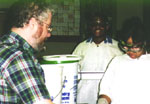| |
 |
|
Research Interests
|
Health Kiosk |
Science Preparation Alliance |
|
|
Research Interests
Psychobiology of learning and memory
Currently, I am studying noncontingent learning processes, such as habituation and classical conditioning, from the theoretical perspective of Activation-evocability theory (AET). This perspective suggests that one must carefully distinguish between stimulus-specific changes in activation potential and relatively nonspecific changes in response evocability. Work in my laboratory has applied AET to the analysis of habituation of the rabbit eyeblink reflex, and we plan to extend this analysis to look at habituation in humans.
Evolution of cognitive processes/comparative cognition
One of my long-term interests has been to understand the evolution of cognitive processes. I approach this interest by trying to understand basic processes in human cognition and by trying to identify comparable processes of cognition in nonhuman animals.
Implicit memory
For the past several years, work in my laboratory has focused on perceptual identification as an example of human "implicit memory". This task first came to prominence with McGinnis' apparent demonstration of perceptual defense in 1947: it received attention again with Jacoby and Dallas' 1981 demonstration of the apparent persistence of priming in perceptual identification. Our work has focused on the role of familarization and codification in perceptual identification.
Human Causal Reasoning
A recent interest is in the question of how people think about the causes of events. One approach to this question uses concepts from associative learning theory, and another approach uses ideas about mental schemata and abstract rules. We are trying to elucidate how these two approaches might be co-ordinated.
Teaching Interests
- 50:830:380 & 381 Experimental Psychology
- 50:830:457 ST: Computers and Applied Cognition
- 50:830:495:07 Independent Study
Fall 1999 Courses
see Fall 1998 selection above, plus
Science Education
Since 1991, I have directed the Science Preparation Alliance of Rutgers and Camden (SPARC) program. This program seeks to enhance science education for precollege students, but its particular focus is on science education in the Camden public schools. The program emphasizes education in the brain, behavioral, and cognitive (BBC) sciences, which remain largely the province of health classes rather than science classes.
In1997, I helped create the Forum for Education in Neuroscience and Applied Cognition. The forum seeks to transform education about the cognitive and neural sciences at the precollege level, communicate to the general public information about advances in these disciplines, and foster the development of interdisciplinary undergraduate programs in brain, behavior and cognition.
In 1998, I developed a curriculum for the Lucent Scholars Khula Project and recruited an instructional team to go to the Eastern Cape Province of South Africa. The project works with science and mathematics teachers of the "historically disadvantaged populations", that is, the nonwhite communities, and the first cycle of academic programs was carried out in June and July of 1998.
Currently, Robert Wood (in the Sociology Department) and I are working on Project VILLAGE with the Camden City Board of Education. This project seeks to link community centers, the Camden Public Library, parochial and private schools with the public schools and Rutgers University to create resource access opportunities for students and community residents.